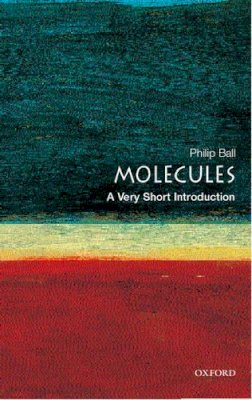5%OFF

Stock image for illustration purposes only - book cover, edition or condition may vary.
Molecules
Philip Ball
€ 13.99
€ 13.29
FREE Delivery in Ireland
Description for Molecules
Paperback. Molecules are the building blocks of matter. Using the molecules of life as a springboard, Philip Ball provides a new perspective on modern chemistry. He shows how molecular scientists are capturing the dynamism of biological molecules in synthetic systems, promising to reinvent chemistry as the central creative science of the new century. Series: Very Short Introductions. Num Pages: 184 pages, numerous halftones and line drawings. BIC Classification: PDX; PDZ; PN. Category: (G) General (US: Trade). Dimension: 175 x 117 x 11. Weight in Grams: 164.
The processes in a single living cell are akin to that of a city teeming with molecular inhabitants that move, communicate, cooperate, and compete. In this Very Short Introduction, Philip Ball explores the role of the molecule in and around us - how, for example, a single fertilized egg can grow into a multi-celled Mozart, what makes spider's silk insoluble in the morning dew, and how this molecular dynamism is being captured in the laboratory, promising to reinvent chemistry as the central creative science of the century. ABOUT THE SERIES: The Very Short Introductions series from Oxford University Press contains hundreds of titles in almost every subject area. These pocket-sized books are the perfect way to get ahead in a new subject quickly. Our expert authors combine facts, analysis, perspective, new ideas, and enthusiasm to make interesting and challenging topics highly readable.
Product Details
Publisher
Oxford University Press United Kingdom
Number of pages
184
Format
Paperback
Publication date
2003
Series
Very Short Introductions
Condition
New
Number of Pages
192
Place of Publication
Oxford, United Kingdom
ISBN
9780192854308
SKU
V9780192854308
Shipping Time
Usually ships in 15 to 20 working days
Ref
99-11
About Philip Ball
Philip Ball is a science writer and a consultant editor for Nature, where he was formerly an editor for physical science for over 10 years. He writes about all areas of science for the international press, and has broadcast on TV and radio. His previous books include Designing the Molecular World, The Self-Made Tapestry, H20:A Biography of Water and The Ingredients: A Guided Tour of the Elements . He holds a degree in chemistry from Oxford University and a doctorate in physics from Bristol University. He lives in London, where his Homunculus Theatre Company occasionally performs on a shoestring budget.
Reviews for Molecules
Review from previous edition If the intimate workings of molecules seem invisible, through Philip Ball's lively pros we see them
coming to life, helping us live. A special delight of this excellent book is the tie that emerges between the wondrous molecules of nature and those chemists make in the laboratory.
Ronald Hoffmann, Chemistry Nobel Laureate 1981
Almost no aspect of the exciting advances in molecular research studies at the beginning of the 21st Century has been left untouched and in so doing, Ball has presented an imaginative, personal overview, which is as instructive as it is enjoyable to read.
Harry Kroto, Chemistry Nobel Laureate 1996
At no point does Stories of the Invisible sacrifice sound science for sound bites - we are in the hands of a scholar and true believer.
John Emsley Nature 20/08/2001
This is a very readable and non-technical survey . . . All of the ingredients of a good work of ficiton are here. It really is a good bedtime read for all.
THES 04/01/2002
Stories of the Invisible is a lucid account of the way that chemists see the molecular world . . . the text is enriched with many historical and literature references, and is accessible to the reader untrained in chemistry
THES, 04/01/2002
coming to life, helping us live. A special delight of this excellent book is the tie that emerges between the wondrous molecules of nature and those chemists make in the laboratory.
Ronald Hoffmann, Chemistry Nobel Laureate 1981
Almost no aspect of the exciting advances in molecular research studies at the beginning of the 21st Century has been left untouched and in so doing, Ball has presented an imaginative, personal overview, which is as instructive as it is enjoyable to read.
Harry Kroto, Chemistry Nobel Laureate 1996
At no point does Stories of the Invisible sacrifice sound science for sound bites - we are in the hands of a scholar and true believer.
John Emsley Nature 20/08/2001
This is a very readable and non-technical survey . . . All of the ingredients of a good work of ficiton are here. It really is a good bedtime read for all.
THES 04/01/2002
Stories of the Invisible is a lucid account of the way that chemists see the molecular world . . . the text is enriched with many historical and literature references, and is accessible to the reader untrained in chemistry
THES, 04/01/2002
